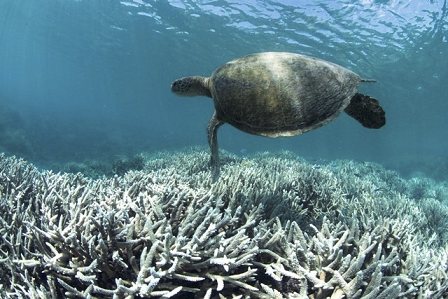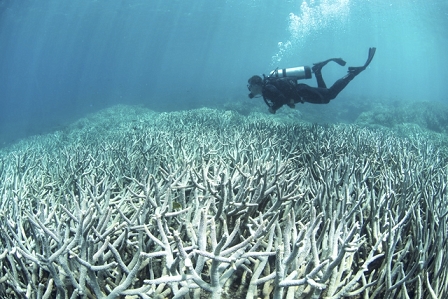Erstellt am: 31. 3. 2016 - 17:05 Uhr
The Great Barrier Reef in crisis
Australia's Great Barrier Reef is experiencing its worst coral bleaching in recorded history. The vivid kaleidoscopic colours that have mesmerized divers for generations - the purples, blues, indigos, lime greens, tan oranges and yellows - have been turning a depressing dull grey and white.
"It’s saddening but we had come to expect this", Professor John Pandolfi of the University of Queensland told me via skype from his Brisbane home.

XL Catlin Seaview Survey
"We are in the midst of the one biggest global bleaching events ever and it was just a matter of time before it would come to Great Barrier Reef."
Pandolfi, one of the world-leading coral scientists, is also unhappy with the Australian government and what he sees as a negligent approach to one of the world’s most significant biodiversity hotspots. "We’re looking for a more consistent policy towards carbon emission control."
This is because the dulling of the reef is directly linked to the greenhous gases the industrialized world has being spewing into the skies; and Australia is one of the worst offenders. Bleaching is caused by rising sea temperatures. 93 percent of climate change heat is absorbed by the ocean, upsetting the delicate balance of marine biology and reefs.
Reefs across the Pacific have had a series of devastating bleachings, including the corals of American Samoa, and Australia's Great Barrier Reef is just the latest victim.
According to the research group XL Catlin Seaview Survey "Corals are unable to cope with today’s prolonged peaks in temperatures - they simply haven’t been able to adapt to the higher base temperatures of the ocean." When exposed to unusually warm water, the corals become stressed and lose the algae that give them their spectacular colour.
And yet far from moving towards strongly tackling emissions, as scientists have urged, Australia has been expanding of its coal export industry to feed China’s appetite for fossil fuels. "It’s a paradox, a contradiction that we all witness here", says Pandolfi. Most controversially an expansion of the Carmichael coal mine, and the Abbot Point port, a Queensland shipping facility perilously close to the reef, including a major dredging process to allow larger ships access to export the dark fruits of Australia’s north-eastern coal-producing region.

XL Catlin Seaview Survey
"We can’t understand how the government can be extracting coal and building new infrastructure to export it", says Pandolfi, "in the face of out of control emissions globally, that are resulting in bleaching on our doorstep."
Cynics might say that the power of the dollar always wins against the vibrancy of nature’s biodiversity, but according to XL Catlin Seaview Survey the sacrifice of the world’s reefs would be an economic folly that would in fact cost the global economy dear in the long run. "Although reefs represent less than 0.1 percent of the world’s ocean floor, they help support approximately 25 percent of all marine species. As a result, the livelihoods of 500 million people and income worth over $30 billion are at stake."
Words rather than action
The Great Barrier Reef, which is actually a collection of about 3,000 individual coral reefs and 750 islands stretching off the coast of the state of Queensland is also a major source of tourism revenue - worth billions of dollars - and is a source of great pride for Australians.
Dieses Element ist nicht mehr verfügbar
With this is mind, reports of its degradation have caused shock waves in the country. But, critics say, instead of investing money and energy on solutions to tackling or mitigate the problem, the government has instead spent millions of dollars on jet-setting PR campaigns. Government officials have flown around the globe to convince delegates to World Heritage Committee not to place the reef on its "in danger" list.
The government's message? Despite the coal plans, everything is just fine at this natural wonder of the world.
This was partly a reaction to a speech in November 2014 by US President Barack Obama. At the University of Queensland, Obama said he feared that "the incredible natural glory of the Great Barrier Reef is threatened". This was seen as an ungracious and dangerous slight by Australian foreign minister Julie Bishop, who disagreed sharply, indignantly telling the press that "of course the Great Barrier Reef will be conserved for generations to come and we do not believe that it is in danger."
It’s easier to keep names of bureaucratic lists than it is to wish away the ravages of global warming - and there is a worrying sense of powerlessness too. If Australia surprised everyone and unilaterally renounced fossil fuels, the sea temperatures would continue to rise and the reef would continue to be at threat. Australia remains one of the world’s top per capita global carbon emitters. But with only 24 million inhabitants it can’t be held responsible for a global crisis that needs a global response.
The Great Barrier Reef will only survive if there are massive global cuts in carbon emissions, an international concert in which the government in Canberra is just one of many players. The problem can seem overawing.
In the shorter term there are domestic political decisions that could have a direct impact on the reef, says Pandolfi. Fine sediment, caused by land erosion, is flowing out of Australia’s rivers and clouding the water near shoreline, blocking the sunlight from reaching the photosynthetic algae. The erosion has been speeded up by factory farming and poor land management. And development of residential housing has also stressed the reef.
For >1000km of the #GreatBarrierReef, corals are severely bleached and dying, yet our government wants more #coal pic.twitter.com/LrtVA41Htj
— Terry Hughes (@ProfTerryHughes) 27 March 2016
Divest, divest
The issues of fossil fuel divestment as well as ocean health will be major topics at this year’s Erdgespräche; with talks from marine explorer Céline Cousteau and Keep it in the Ground campaigner Alan Rusbridger
"We need to clean up the reef. We need to clean up the water around the reef", says Professor John Pandolfi "Studies have shown that if reefs are otherwise kept healthy, they are more resistant to changes in sea temperature."
At the end of the day the battle to save the Great Barrier Reef is inextricably linked with the battle to reduce carbon emissions and to slow global warming. Pandolfi suggests a clear action plan: "We need to immediately reduce emissions, not only in Australia but worldwide. We can do that by putting pressure on our social institutions and governments to divest from the major emissions players from around the world. We can do that by personally divesting too."
So once again, for ecologists, the battle cry of 2016 is divest, divest divest.


